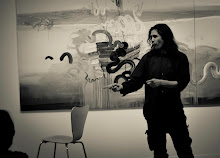Assumptions and simplification are of course the mainstays of thought. It is so difficult to get thinking for oneself, or to make one's own point, if one has to assume another's argument is ever more subtle... How can one argue with real thought as it is actually thinking? One can only argue, if one can find a neat place to disagree. To hack one's own way into thinking is therefore invariably to clear space in an actually shifting argument, a space in which one can define and nail down another argument; in order to be able to start thinking or at least arguing, for oneself.
Now in a sense this simplification does make sense. Actions are, after all, done (or not): They are events, which have ramifications and open out histories, but do happen (in some form). To argue for oneself is therefore to treat other thinkers and their arguments as if they were events, which might cast long shadows, but whose form is knowable, and effects traceable. But of course the effect of such simplification on a discipline such as philosophy, which is all about the argument, is that all great thinkers become, for all but their exponents (and sometimes antagonists) mere caricatures of themselves. Even more than that, their arguments become simplified and distinct. Once you are part of a canon, the byways that led to the argument become very unimportant, as everyone wants to get to the real deal.
More than that, the philosophical extras, the playful texts, and weird essays that mark the careers of the great writers risk being lost. The problem being, that in these texts, one often as not meets 'another writer', and a very different one, from the one that one thought one knew. And to lose sight altogether of these texts is such a pity. For what makes a great thinker is surely the capacity to think many things, argue differently, and sometimes mischievously or oddly or obscurely or maybe even to change one's mind and change it back again: What is greatness but the capacity to experiment and think many things? So much so, that I might argue that it is in the oddities, and byroads of their thought, and not in their 'royal roads' that you real feel a great thinker at work. More than that, it is often these playful essays that reveal deep things about the way in which a great thinker works, and the way that their arguments are crafted. It is also these texts that are often the easiest to read for the non-philosopher. It is therefore such a pity that in the rage to teach, to learn and to argue, that they can become so obscured.
It is these more playful or sometimes frankly weird works, that my new sequence of performance pieces will aim to explore. I will endeavour to take thinkers who often seem difficult and remote to general audiences, and through performing their minor works, their little essays turn them into playful friends, whose arguments fairly rip off the page, make immediate sense, and are even fun. The aim being to show what for me is such a cardinal truth: That thinking, however difficult the process is so much Fun!


This is really interesting..
ReplyDeleteClasses A to Z